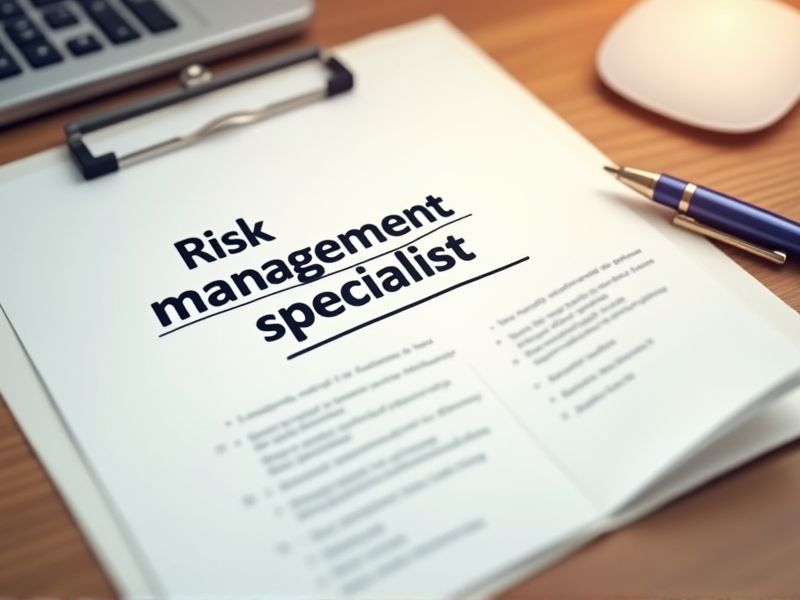
Risk management specialists navigate complex financial landscapes, and certifications ensure they possess the necessary skills to identify and mitigate risks effectively. Certifications validate a specialist's expertise, increasing employer trust and enhancing career opportunities. As regulations and risk factors continuously evolve, professionals need up-to-date knowledge reflected in the ongoing certification process. Some critical certifications you may need as a risk management specialist include the Chartered Financial Analyst (CFA), Financial Risk Manager (FRM), and Certified Risk Manager (CRM).
Financial Risk Manager (FRM)
Financial Risk Managers (FRMs) provide essential expertise in identifying potential financial risks that could impact an organization's profitability. Their specialized knowledge in quantitative analysis equips organizations to forecast and mitigate risks related to market volatility, credit exposures, and operational inefficiencies. FRMs implement tailored risk management frameworks, ensuring that strategies align with regulatory requirements and corporate objectives. Their role significantly enhances an organization's ability to make informed decisions, protecting it from unforeseen financial disruptions.
Professional Risk Manager (PRM)
A Professional Risk Manager (PRM) possesses validated expertise and industry-recognized credentials critical for in-depth risk assessment. Their comprehensive understanding of financial theories and models enhances a risk management specialist's ability to anticipate potential threats and mitigate them effectively. Employing a PRM adds credibility and trust, assisting organizations in maintaining regulatory compliance. The structured approach a PRM brings to risk management facilitates well-informed decision-making, improving overall business resilience.
Certified in Risk and Information Systems Control (CRISC)
CRISC certification provides in-depth knowledge of assessing and managing IT and enterprise risk, crucial for a risk management specialist. It enhances professional credibility by aligning skills with industry standards in risk management and control. CRISC holders are better equipped to develop and implement effective risk-based information system controls. Possessing this certification can lead to higher career advancement potential and salary opportunities in the risk management field.
Certified Risk Management Professional (CRMP)
Obtaining the Certified Risk Management Professional (CRMP) credential enhances a risk management specialist's credibility by showcasing their commitment to understanding robust risk management frameworks. As organizations face increasingly complex risks, a CRMP designation ensures that specialists have the updated skills to effectively identify, assess, and mitigate potential threats. Employers often prefer certified professionals, leading to higher job prospects and potential salary increases for CRMP holders. The certification provides access to a network of professionals and ongoing education opportunities, fostering continuous growth and adaptation in risk management practices.
Certified Information Systems Security Professional (CISSP)
CISSP certification provides a comprehensive understanding of security protocols, which enhances a risk management specialist's ability to identify potential vulnerabilities. By mastering various domains of cybersecurity, such as asset security and risk management, these professionals can implement effective measures to mitigate risks. Organizations often prioritize hiring CISSP-certified individuals because they demonstrate proficiency in developing robust security architectures. The certification also validates the specialist's commitment to ongoing education in cybersecurity trends, essential for adapting to evolving threats.
Certified Risk Management Assurance (CRMA)
The Certified Risk Management Assurance (CRMA) credential equips risk management specialists with the skills to effectively evaluate risk processes, enhancing their ability to align with international standards. Possessing a CRMA indicates a deeper understanding of risk management, contributing to more strategic decision-making and improved organizational resilience. Organizations value the CRMA as it demonstrates a specialist's commitment to proactive risk assessment, potentially reducing losses and safeguarding reputation. The structured CRMA curriculum empowers professionals to facilitate better risk management implementation, ensuring comprehensiveness and reliability in their assessments.
Certified Business Continuity Professional (CBCP)
The Certified Business Continuity Professional (CBCP) credential equips risk management specialists with an in-depth understanding of business continuity planning, ensuring they can effectively mitigate disruptions. Expertise in CBCP helps identify vulnerabilities and develop comprehensive strategies to maintain critical operations during crises. This certification enhances a specialist's ability to align continuity plans with organizational objectives, improving resilience. Employers often value the CBCP credential as it signifies a commitment to maintaining robust risk management frameworks.
ISO 31000 Lead Risk Manager
ISO 31000 Lead Risk Manager provides a structured framework that enables risk management specialists to effectively identify, assess, and mitigate risks in various organizational contexts. By aligning with ISO 31000 standards, specialists ensure consistent and transparent risk management processes that enhance decision-making and stakeholder confidence. The certification equips professionals with advanced skills to tailor risk strategies based on the specific needs of a business, leading to optimized performance and resilience. Organizations adopting this approach benefit from a proactive stance on risk, reducing potential financial and operational disruptions.
Certified Fraud Examiner (CFE)
The presence of a Certified Fraud Examiner (CFE) enhances a risk management specialist's capacity to identify and mitigate potential fraudulent activities within an organization. CFEs bring specialized knowledge in fraud prevention, detection, and investigation, which is crucial in assessing vulnerabilities and implementing effective controls. Their expertise in understanding the intricacies of fraud schemes can lead to more accurate risk assessments and tailored strategies for risk mitigation. Incorporating a CFE into a risk management team reduces the likelihood of financial loss and reputational damage due to fraudulent actions.
Project Management Professional (PMP)
A PMP certification enhances a risk management specialist's credibility and trust among stakeholders, leading to better decision-making confidence. The structured knowledge from the PMP framework equips professionals with the skills to identify, assess, and mitigate risks systematically. Possession of a PMP helps align risk management strategies with overarching project goals, ensuring coherence across planning and execution phases. Increasingly complex project environments require standardized approaches that PMP qualifications validate, making them essential for comprehensive risk management.
Summary
With certifications, you enhance your expertise in risk management. This expertise leads to improved job performance and decision-making capabilities. Consequently, your career prospects and earning potential in the industry significantly increase. Employers view you as a more credible and reliable asset.
